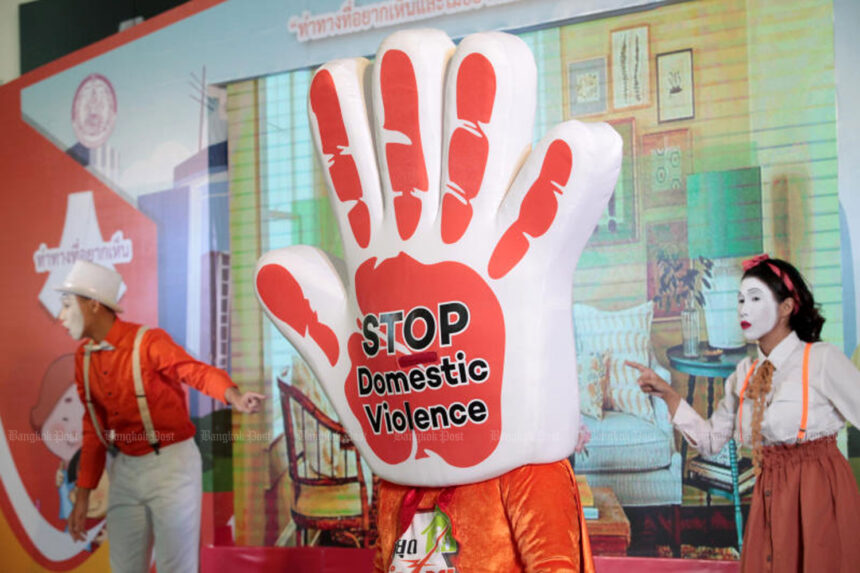BANGKOK – Rights groups across Thailand continue to voice concerns about the ongoing failure of the Domestic Violence Protection Act 2007 to address the country’s growing domestic abuse problem.
Experts and advocates say that while the law was meant to safeguard victims, it often puts family unity ahead of safety and justice, leaving women, children, and the elderly at risk of continued harm.
Reports from the Ministry of Public Health’s One Stop Crisis Center (OSCC) show a steady rise in cases, with numbers climbing from 25,767 in 2010 to 31,866 in 2013. By 2015, nearly 24,000 women had turned to the centre for help.
Fortify Rights, in a recent report, highlighted that almost 65% of all cases reported to the Ministry of Social Development and Human Security relate to domestic violence, with women making up nearly 90% of victims. Children aged 10 to 20 are affected in more than a third of these cases.
Official figures likely undercount the problem. The United Nations Office on Drugs and Crime (UNODC) estimates that only one in nine cases gets reported. Many victims stay silent due to stigma and fear of backlash.
Supensri Puengkhoksung, head of the Social Equality Promotion Foundation, pointed out that many see domestic violence as a private family matter. This belief stops people from asking for help. Women, in particular, worry that others will blame them for breaking up the family.
Activists say this case shows how bold and public domestic abuse can be, and how urgently stronger protections are needed. They argue that the system still fails to prevent or respond to such violence.
Weak Enforcement and Focus
The 2007 Domestic Violence Protection Act was brought in to meet international standards, including those set by the Convention on the Elimination of All Forms of Discrimination Against Women (CEDAW). But many rights groups believe the law is flawed.
It often pushes for reconciliation between victims and abusers, putting pressure on survivors to return to unsafe homes for the sake of “family unity.” Weak enforcement and a focus on mediation over justice contribute to low conviction rates and repeated abuse.
Jaded Chouwilai, head of the Women and Men Progressive Movement Foundation, explained that the law still treats domestic violence as a family issue, not a crime. Police and prosecutors often push victims to settle matters quietly instead of pursuing legal action.
In 2019, a move to replace the law with the Family Institute Protection Act failed when officials admitted they weren’t ready, adding to the uncertainty.
Activists and legal experts are pushing for big changes. They want the law to focus on victim safety and move away from outdated social values. Proposals include making domestic violence a non-negotiable offence so that cases go to court regardless of family wishes.
They also suggest trauma-informed care in court processes. Areewan Jatuthong, a leading women’s rights lawyer, highlighted the need for well-trained case managers to help survivors through the legal and support system. Many local officials lack the right skills or resources and may even side with abusers.
Advocates also want stronger laws to cover all types of abuse, including verbal, online, and psychological harm, as current rules fall short. Jaded Chouwilai pointed out the lack of specific laws on sexual harassment and called for new rules to protect women and girls from growing threats, both offline and online.
Domestic Violence Links to Drug Use and Mental Health
Drug abuse and mental health problems often play a big part in domestic violence cases. Many survivors report that substance use makes violent behaviour worse. Porntip, a farmer from Khon Kaen, shared that her husband’s drug habit led to more severe abuse during the COVID-19 lockdown. When she went to the police, they dismissed her case as a “domestic issue.”
Access to mental health care also remains limited. Survivors often suffer long-term trauma, yet counselling services are underfunded and hard to reach, especially in rural areas like Chiang Rai. Mookdapa Yangyuenpradorn from Fortify Rights stressed that survivors need ongoing psychological support to rebuild their lives.
Older women and children face extra dangers in abusive homes. Traditional family roles often put elderly women at the mercy of others, making them more open to neglect or violence. Children who live with or see domestic abuse suffer deeply. A 2018 study found that such children are three times more likely to either become victims or abusers later in life, showing the need for early action.
Supensri emphasized the importance of community monitoring and easy access to support services. Shelters should welcome all survivors, even those who don’t want to pursue legal action because of social pressure. NGOs are also calling for education to break down gender stereotypes and teach young people how to spot and report abuse.
As domestic violence continues to affect families across Thailand, rights groups say urgent action is needed. Stronger laws, better support services, and a shift away from blaming victims will help protect survivors and hold offenders to account.
The Chiang Rai Times supports calls for a victim-first approach, focusing on safety, justice, and recovery for women, children, and the elderly. Until real changes are made, this silent crisis will continue to harm lives and break families apart.
For confidential help, contact Thailand’s domestic violence hotline at 1300 or reach out to groups such as the Social Equality Promotion Foundation.
















